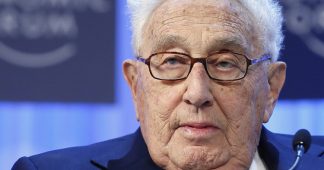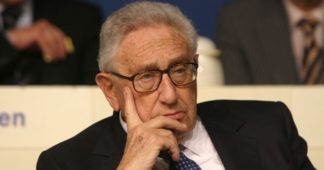Henry Kissinger gives exclusive interview weeks before his death
Influential Jewish-American statesman and geopolitical expert Henry Kissinger recalled the drama behind the Yom Kippur War, Israel’s finest hour, in this interview.
By AVINOAM BAR-YOSEF
Updated: NOVEMBER 30, 2023
Henry Kissinger, American diplomat and Nobel winner, passed away on Thursday morning. Ahead of Yom Kippur, he gave The Jerusalem Post an exclusive interview.
“At six thirty in the morning, Joseph Sisco, then-assistant secretary for the Middle East, asked to see me urgently. ‘There is a crisis in the Middle East,’ he said. ‘And if you act immediately you can still stop it.’” Dr. Henry Kissinger, the legendary US secretary of state and national security advisor, was remembering the morning of Yom Kippur, 1973.
He was in New York with the entire State Department senior team on the occasion of the United Nations annual conference. It was both Yom Kippur and Shabbat. Dawn was beginning to break. The most Jewish city outside of Israel was not yet awake.
He recalls: “The reports were vague. It was said that the Israelis must have attacked because nobody believed that the Egyptians were capable of launching an attack across the Suez Canal. I said: ‘The one thing that is not happening is that the Israelis would attack on Yom Kippur. That is practically – almost – impossible. But by the middle of the day, it became apparent that this was a regular war, that it was a full-scale attack. Our team believed that the Israelis would smash them in a few hours. The first thing I did was turn to the Israeli ambassador Simcha Dinitz. He was not in Washington. He was in Jerusalem.”
In Israel, hours and days passed as chief of staff Maj.-Gen. David Elazar’s promise, to “break Egypt’s bones,” made on the first day of fighting, still awaited fulfillment. Israel had been caught off guard.
Fifty years have passed since the drama of the Yom Kippur War. In an exclusive conversation, Kissinger is ready to discuss that chapter of his life. We speak on Zoom at the end of the summer, before he returns home to New York from his Connecticut farm. He sits in his study, surrounded by shelves filled with books and files of as-yet-unpublished documents.
Kissinger expresses himself with ease. His thinking is sharp. His wise gaze is focused. His memory for details belies his age. Four months ago, he celebrated his 100th birthday. His hair, which had already begun to turn gray during his trips, hopping between Jerusalem and Cairo at the end of the Yom Kippur War, has become silver. He is wearing a blue blazer over a gray polo shirt. Vital, as always.
“Forgive me, I am not wearing a tie. It’s summer and it’s not a TV interview,” he half apologizes.
Full disclosure: I am a Henry Kissinger fan. I admire him not only as a statesman, not only for his ability to see the bigger picture, nor only for his writings, or his special way of navigating and influencing. I feel deep affection for him as a human being. I love his implicit sense of humor. Despite the criticism evoked by his controversial statements about Judaism, I believe that the memory of his relatives lost in the Holocaust is sacred to him.
I believe that his Judaism is dear to him; and that his contribution to the existence of the State of Israel was decisive, at a fateful time for our people. I learned about this from Yitzhak Rabin, who spoke of him with much admiration, warmth, and great appreciation.
Over the years, I have made sure to meet up with Kissinger and to learn from him. At first, as a journalist, I was interested in his political analyses, and later – after the founding the Jewish People Policy Institute (JPPI) – I would consult him about setting strategic goals for the Jewish people, and sometimes, as we conversed, he would ask me to analyze the political situation in Israel.
Continue reading at https://www.jpost.com/israel-news/article-760287
We remind our readers that publication of articles on our site does not mean that we agree with what is written. Our policy is to publish anything which we consider of interest, so as to assist our readers in forming their opinions. Sometimes we even publish articles with which we totally disagree, since we believe it is important for our readers to be informed on as wide a spectrum of views as possible.







